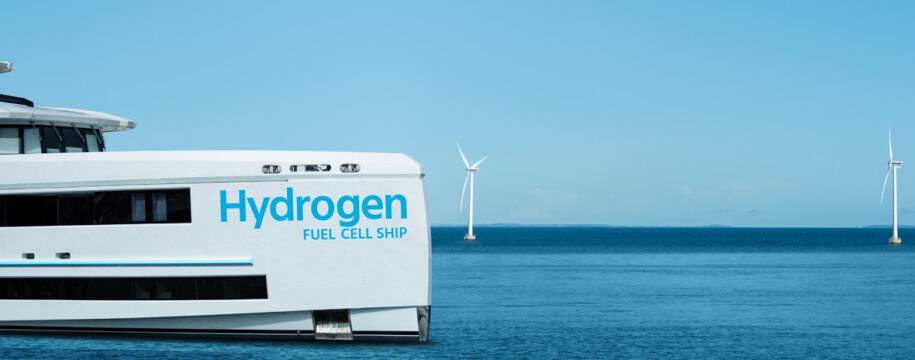Navigating away from fossil fuels and embracing sustainable alternatives has become the need of the hour. Among these, hydrogen fuel cell technology for marine applications stands out as a promising solution. Offering high energy density, this revolutionary technology propels long-distance travel, ensuring an unmatched energy output compared to traditional marine fuels. Further, with fuel cells at the helm, operational efficiency in marine vessels takes a leap forward. This piece delves into the world of green hydrogen, shedding light on its potential as a sustainable alternative to fossil fuels in boating. The focus then shifts to the multiple advantages of fuel cell for boat technology over traditional combustion engines in boats. Lastly, the economic benefits of hydrogen-powered boats are examined, emphasizing the cost-effective power generation they offer. Nautical navigation is about to get a whole lot greener.
Exploring the high energy density of hydrogen fuel for marine applications
Highlighting the realm of marine applications, the high energy density of hydrogen fuel stands out as a crucial element in the quest for cleaner, more efficient energy solutions. Delving into the intricacies of hydrogen production, it becomes evident that the process of deriving hydrogen from water is not only fascinating but also a testament to the potential of this energy source.
Unlocking the secret to long-distance travel lies in the high energy density of hydrogen fuel. Comparatively, traditional marine fuels fail to match the energy output of hydrogen, thereby making hydrogen a more viable solution for powering marine vessels.
Unlocking long-distance travel with hydrogen fuel's high energy density
One of the primary advantages of hydrogen fuel is its high energy density. This attribute enables it to fuel long-distance marine travel, thereby surpassing the capabilities of traditional fuels.
Comparing energy outputs : hydrogen vs. traditional marine fuels
Digging deeper into the comparison between hydrogen and traditional marine fuels, it becomes clear that the energy output of hydrogen fuel far exceeds that of its counterparts. This superior energy output stems from its high energy density, which translates to longer travel distances and improved operational efficiency.
Enhancing operational efficiency in marine vessels with hydrogen fuel
Additionally, the use of hydrogen as an energy source in marine applications has been proven to enhance operational efficiency. Apart from being stored under high pressure, the safety of using hydrogen in marine applications is yet another factor that contributes to its growing popularity.
Green hydrogen: a sustainable alternative to fossil fuel in boating
Green hydrogen presents a promising, sustainable alternative to traditional fossil fuels within the boating industry. Through the process of electrolysis, this renewable energy source is produced from water, making it an eco-friendly solution. Its production method is sustainable as it promotes the use of renewable resources and emits zero carbon, contributing to the reduction of greenhouse gases. With the boating sector's transition to green hydrogen, conventional motorboats can be converted into a cleaner and more efficient mode of transport. The conversion costs, though initially high, promise a long-term economic advantage due to the renewable nature of green hydrogen.
Performance-wise, boats running on green hydrogen are comparable to traditional motorboats. Numerous maritime companies have already started adopting green hydrogen, showcasing its effectiveness and reliability. Maintenance, although different from conventional boats, does not pose significant challenges. The industry, however, faces obstacles in transitioning entirely to green hydrogen, mainly due to the current lack of green hydrogen refuelling infrastructures.
Fuel cell technology in boats: advantages over traditional combustion engines
Boats empowered by fuel cell technology have been making waves in the maritime industry, offering a compelling alternative to traditional combustion engines. These high-tech vessels have a multitude of advantages, from environmental benefits to potential operational cost savings.
Fuel cells are a form of power generation that is both robust and sustainable. Unlike traditional engines that burn fossil fuels, fuel cells generate electricity through a chemical reaction between hydrogen and oxygen. This hydrogen combustion process produces only water vapor and heat, significantly reducing CO2 emissions.
Moreover, fuel cell technology offers potential cost savings in terms of operation, maintenance, and replacement. With fewer moving parts than a traditional engine, fuel cell systems may require less maintenance and have a longer lifespan.
Implementing fuel cell technology in boats doesn't compromise performance. In fact, boats equipped with fuel cells often perform better than those with traditional engines, providing a smoother ride with less noise and vibration.
Despite these benefits, some challenges need to be overcome for wider adoption, including technical issues and the initial high cost of fuel cell systems. However, the market opportunities and growth potential for this technology in the maritime sector are significant, signaling a promising future for fuel cell technology in the boating industry.
Cost-effective power generation: the economic benefits of hydrogen powered boats
The burgeoning industry of hydrogen-powered boats presents a compelling case for a sustainable future in marine transportation.
Hydrogen, as a clean and renewable energy source, offers several advantages over traditional diesel-powered boats. By leveraging hydrogen power, a boat will experience increased performance and longevity, while contributing significantly to the reduction of CO2 emissions.
The cost of running a hydrogen boat, in comparison to a diesel one, demonstrates the economic benefits of this technology. While the initial investment may be higher, the long-term savings due to reduced fuel and maintenance costs are significant. However, the cost-effectiveness of hydrogen power largely depends on the availability of infrastructure for hydrogen production and distribution.
Hydrogen can be produced affordably for use in boats through several methods, including electrolysis of water and reforming of natural gas. Current and future trends in the hydrogen boat industry show a promising shift towards sustainability, with several leading companies investing heavily in innovative projects and technological advancements.
